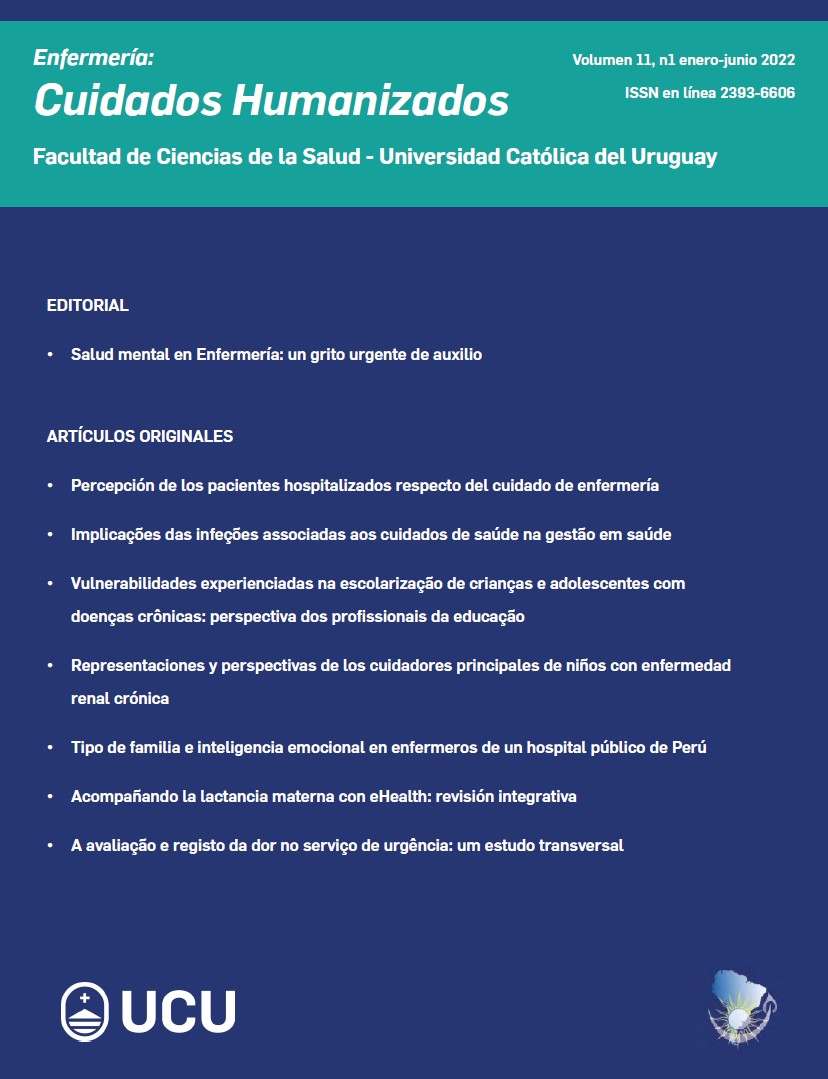Representations and perspectives of primary caregivers of children with chronic kidney disease
DOI:
https://doi.org/10.22235/ech.v11i1.2615Keywords:
cuidado del niño; insuficiencia renal crónica, padres; perspectiva de géneroAbstract
Introduction: Pediatric chronic kidney disease (CKD) is a serious health problem that affects the life of the adults and generates psychosocial impact on the family network. Objective: To reveal the representations and perspectives of primary caregivers of children with chronic kidney disease. Methodology: Study with phenomenological design administered in 9 informants, collection of information through in-depth interviews, category analysis, triangulation by researcher, safeguarding the rigorous criteria of Guba and Lincoln, and respect for the ethical principles of Ezekiel Emanuel. Results: The meta categories “living the disease”, “highly demanding disease” and “support networks present” emerged. Discussion: Coping with the disease is threatened by physical fatigue, uncertainty, and alteration of support within and outside the family structure. A similar result is found in the base study. The management of the child is carried out by the mother in almost all the activities associated with its treatment. Conclusions: Women provide care invisibly and continuously. It is necessary to make it visible as a social problem, to establish policies with a gender perspective that determine corrections of inequities that cultural stereotypes provide, as well as to make visible the need for greater nursing intervention as support for informal care.
Downloads
References
Flores JC, Alvo M, Borja H, Morales J, Vega J, Zúñiga C, et al. Enfermedad renal crónica: Clasificación, identificación, manejo y complicaciones. Rev. méd. Chile [Internet]. 2009 Ene [citado 2021 Dic 07];137(1):137-177. DOI: 10.4067/S0034-98872009000100026
Harambat J, van Stralen KJ, Kim JJ, Tizard EJ. Epidemiology of chronic kidney disease in children. Pediatr Nephrol. 2012 Mar;27(3):363-73. DOI: 10.1007/s00467-011-1939-1.
ESPN/ERA Registry [Internet]. European Registry for Children on Renal Replacement Therapy; 2021. Disponible en www.espn-reg.org/index.jsp
Wong CJ, Moxey-Mims M, Jerry-Fluker J, Warady BA, Furth SL. CKiD (CKD in children) prospective cohort study: a review of current findings. Am J Kidney Dis. 2012;60(6):1002–11. DOI: 10.1053/j.ajkd.2012.07.018
Wedekin M, Ehrich JH, Offner G, Pape L. Renal replacement therapy in infants with chronic renal failure in the first year of life. Clin J Am Soc Nephrol. 2010;5:18-23.
Asociación Española de Pediatría [Internet]. Protocolos diagnósticos y terapéuticos en Nefrología Pediátrica Asociación Española de Nefrología Pediátrica; 2014. Disponible en https://www.aeped.es/protocolos/
Baum M. Overview of chronic kidney disease in children. Curr Opin Pediatr. 2010;22(2):158–60. DOI: 10.1097/MOP.0b013e32833695cb
Cano Sch F, Rojo LA, Ceballos OML. Enfermedad renal crónica en pediatría y nuevos marcadores moleculares. Rev. chil. Pediatra. 2012 Abr [citado 2021 Dic 07]; 83(2):117-127. DOI: 10.4067/S0370-41062012000200002
López MM. Enfermedad renal crónica pediátrica [Internet]. Slideshare.net. [citado el 30 de julio de 2021]. Disponible en: https://es.slideshare.net/MML93/enfermedad-renal-crnica-pediatrica
Martínez-Castelao A, Górriz-Teruel J, Bover-Sanjuán J, Segura-de la Morena J, Cebollada J, Escalada J, et al. Documento de consenso para la detección y manejo de la enfermedad renal crónica. Nefrología. 2014 [citado el 30 de julio de 2021];34(2):0-272. DOI:10.3265/Nefrologia.pre2014.Feb.12455
Montell Hernández OA, Vidal Tallet A, Sánchez Hernández C, Méndez Dayout A, Delgado Fernández M del R, Bolaños Drake FM. Enfermedad renal crónica no terminal en los pacientes en edad pediátrica ingresados y seguidos en consulta de Nefrología. Rev médica electrón. 2013;35(1):1–10.
Song R, Yosypiv IV. Genetics of congenital anomalies of the kidney and urinary tract. Pediatr Nephrol. 2011;26(3):353–64. DOI: 10.1007/s00467-010-1629-4.
García Ramírez M, García Martínez E. Afectación renal en las enfermedades sistémicas. Protoc Diagn Per Pediatr. 2014;(1):333-53.
Saura Hernández M del C, Brito Machado E, Duménigo Lugo D, Viera Pérez I, González Ojeda GR. Malformaciones renales y del tracto urinario con daño renal en Pediatría. Rev. Cubana Pediatr. 2015;87(1):40–9.
Asociación Española de Nefrología Pediátrica. Nefrología pediátrica: manual práctico. Madrid: Médica Panamericana; 2011.
Rees L, Mak R. Nutrition and growth in children with chronic kidney disease. Nat Rev Nephrol. 2011;7:615-23.
Andreu Periz D, Sarria J A. Actualidad del Tratamiento Renal Sustitutivo Pediátrico. Enferm Nefrol [Internet]. 2017 Jun [citado 2021 Dic 08]; 20(2):179-183. DOI: 10.4321/s2254-288420170000200011.
KDIGO. KDIGO Clinical Practice Guidelines for Glomerulonephritis. Kidney Int Supl. 2012;2:139-274
Schütz, A. Estudios sobre teoría social. Buenos Aires: Amorrortu; 1974.
Emanuel E. ¿Qué hace que la investigación clínica sea ética? Siete requisitos éticos. En Lolas, F, Quezada, A, editores. Pautas éticas de investigación en sujetos humanos: nuevas perspectivas Santiago de Chile: Programa Regional de Bioética OPS/OMS; 2003, p. 83-96.
Rodríguez Yunta E. Comités DE evaluación ética y científica para la investigación en Seres humanos y Las pautas CIOMS 2002. Acta Bioeth. 2004;10(1):37–48.
Guba E, Lincoln Y. Competing Paradigms in Qualitative Research. En Denzin NK, Lincoln YS, editores. Handbook of qualitative research. Thousand Oaks:Sage; 1994, p. 105-117.
Uribe Meneses A. Características familiares en situación de enfermedad crónica. Respuestas. 2014;19(1):6–12.
Arias Flores E. La rabia de siete a ocho: Un acercamiento semiótico a La familia de Nuni Sarmiento. Logos. 2018;28(2):337–45. Disponible en: https://www.readcube.com/articles/10.15443%2Frl2825
Crasborn A. Calidad de vida en niños y adolescentes con enfermedad renal crónica terminal. Fundación para el niño enfermo renal (Fundanier), Guatemala, julio 2018 [Tesis de grado]. Guatemala: Universidad Rafael Landívar; 2018. Disponible en: http://recursosbiblio.url.edu.gt/tesiseortiz/2018/09/18/Crasborn-Andrea.pdf
Dotis J, Pavlaki A, Printza N, Stabouli S, Antoniou S, Gkogka C, et al. Quality of life in children with chronic kidney disease. Pediatr Nephrol. 2016;31(12):2309–16. DOI: 10.1007/s00467-016-3457-7
Harshman LA, Johnson RJ, Matheson MB, Kogon AJ, Shinnar S, Gerson AC, et al. Academic achievement in children with chronic kidney disease: a report from the CKiD cohort. Pediatr Nephrol. 2019;34(4):689–96. DOI: 10.1007/s00467-018-4144-7
O’Hare BA-M, Devakumar D, Allen S. Using international human rights law to improve child health in low-income countries: a framework for healthcare professionals. BMC Int Health Hum Rights. 2016;16(1):11. DOI: 10.1186/s12914-016-0083-1
Downloads
Published
How to Cite
Issue
Section
License
Copyright (c) 2022 Enfermería: Cuidados Humanizados

This work is licensed under a Creative Commons Attribution 4.0 International License.

















